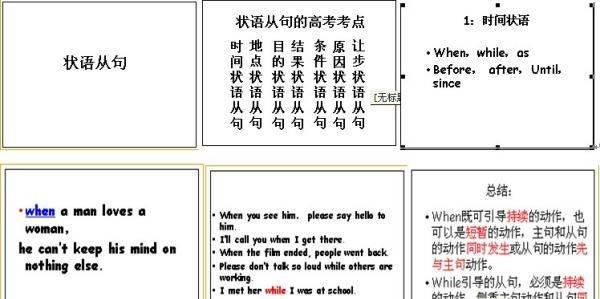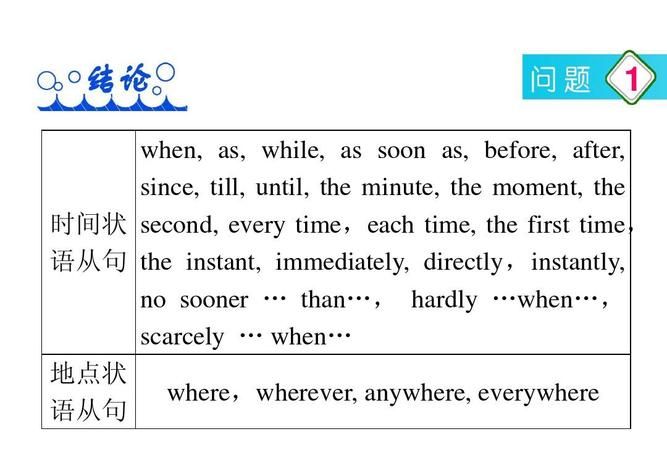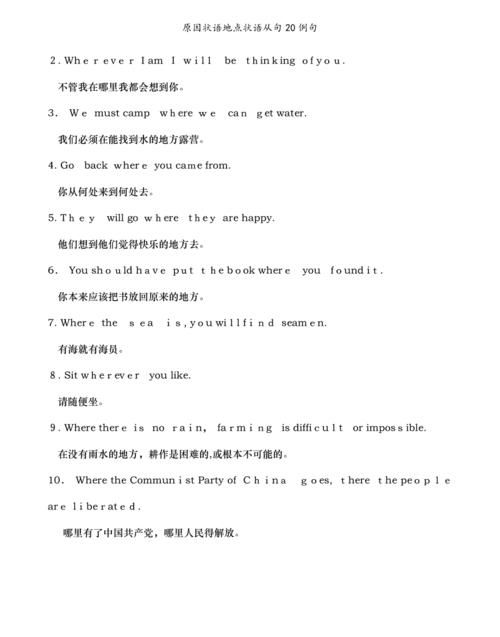本文目录
英语语法状语从句的归纳总结
地点状语从句的英语语法
我整理了2017年英语语法大全,供同学们参考,希望能够帮助同学们提高学习成绩。

1. 引导地点状语从句的从属连词主要有where (在…的地方), wherever(无论什么地方), everywhere(每个…地方), anywhere(任何…地方)。如:
I’m not living where I was. 我不在原处住了。
You can’t camp where [wherever, anywhere] you like these days. 如今你可不能随 便在哪儿宿营。
Everywhere I go, I find the same thing. 不管我走到哪里,我都发现同样情况。
2. 有的同学认为地点状语从句在平时见得不多,误认为考试不会涉及,但恰恰相反,地点状语 从句却是高考经常考查的一个知识点。请看以下高考真题:
(1) When you read the book, you’d better make a mark _____ you have any questions.
A. at which B. at where C. the place where D. where
(2) After the war, a new school building was put up _____ there had once been a theatre.
A. that B. where C. which D. when
(3) You should make it a rule to leave things _____ you can find them again.
A. when B. where C. then D. there
(4) She found her calculator ______ she lost it.
A. where B. when C. in which D. that
以上四题均选 where,其意为在…的地方,用以引导地点状语从句。
;
状语从句经典例句20个
一、时间状语从句 常用引导词:when(在…时), as(当…时), while(在…期间), as soon as(一……就……), before(在…之前), after(在...之后), since(自从...以来) , not...until(直到…才)untill/till(直到…时)等 特殊引导词:the minute, the moment, the second, every time, the day,the instant( 瞬间,顷刻), immediately , directly(不久,立即), no sooner … than(一...就...), hardly …when(刚一...就...) , scarcely … when(刚...就.../一...就...) 当用no sooner … than,hardly …when,scarcely … when作为引导词的时候,从句要部分倒装。 I didn’t realize how special my mother was until I became an adult.
直到我成为了一个成年人我才意识到我的母亲是多么的特殊。
While John was watching TV, his wife was cooking.
当约翰看电视时,他的妻子正在做饭。
The children ran away from the orchard(果园), the moment they saw the guard.
孩子们一看到守卫就逃出了果园。
No sooner had I arrived home than it began to rain.
还没等我到家就开始下雨了。(<--- This translation is wrong. No sooner...than... means something happened right after something happened. )(我一到家就开始下雨了。)
Every time I listen to your advice, I get into trouble.
每当我听取你的建议时,我就会惹上麻烦。
二、地点状语从句
常用引导词:where
特殊引导词:wherever, anywhere, everywhere
Generally, air will be heavily polluted where there are factories.
一般来说,有工厂的地方空气污染就严重。
Wherever you go, you should work hard.
无论你去哪里,你都应该努力工作。
地点状语从句一般由连接副词where, wherever等引导,已经形成了固定的句型,例如:
Where there is no rain, farming is difficult or impossible.
在没有雨水的地方,耕作是困难的或根本不可能的。
They were good persons. Where they went, there they were warmly welcomed.
他们都是好人。因此他们走到哪里都受到热烈欢迎。
You should have put the book where you found it.
你应该把书放回原来的地方。
Where the Communist Party of China goes, there the people are liberated.
哪里有了中国共产党,哪里的人民就得解放。
Wherever the sea is , you will find seamen.
有海就有海员。
三、原因状语从句
常用引导词:because, since, as,
特殊引导词:seeing that, now that, in that, considering that, given that.
My friends dislike me because I’m handsome and successful.
我的朋友都不喜欢我,因为我又英俊又成功。
Now that everybody has come, let’s begin our conference.
既然每个人都到了,让我们开始我们的会议吧。
The higher income tax is harmful in that it may discourage people from trying to earn more.
更高的收入税是有害的,因为它或许会阻碍人们努力赚钱。
四、目的状语从句
常用引导词:so that, in order that
特殊引导词:lest, in case, for fear that,in the hope that, for the purpose that, to the end that
The boss asked the secretary to hurry up with the letters so that he could sign them.
老板要求秘书快写函件以便他能在上面签字。
The teacher raised his voice on purpose that the students in the back could hear more clearly.
为了让后面的学生听得更清楚,老师有意地提高了他的声音。注意,由for引导的是一个并列句,不是原因状语从句,但有表原因的意思,是并列连词
五、结果状语从句
常用引导词:so … that, such … that,
特殊引导词:such that, to the degree that, to the extent that, to such a degree that,
He got up so early that he caught the first bus.
他很早起床以便赶上第一班公共汽车
It’s such a good chance that we must not miss it.
这是一个好机会,千万不能错过它
To such a degree was he excited that he couldn’t sleep last night.
他激动到这个程度,以至于他昨晚睡不着
六、条件状语从句
常用引导词:if, unless,whether(whether...or not)
特殊引导词:as/so long as, only if, providing/provided that, supposing that, in case(美语中表条件,英语中表目的), on condition that
We’ll start our project if the president agrees.
如果总统同意,我们将开始我们的项目
You will certainly succeed so long as you keep on trying.
只要你继续努力,你一定会成功的。
Provided that there is no opposition, we shall hold the meeting here.
如果没有人反对,我们就在这里开会。
七、让步状语从句
常用引导词:though, although, even if, even though
特殊引导词: as(用在让步状语从句中必须要倒装),while ( 一般用在句首 ),no matter …, in spite of the fact that, whatever, whoever, wherever, whenever, however, whichever
Much as I respect him, I can’t agree to his proposal.
尽管我很尊敬他, 但是我却不同意他的建议。
The old man always enjoys swimming even though the weather is rough.
老人都很喜欢游泳,即使天气很恶劣。
No matter how hard he tried, she could not change her mind.
不论他如何努力,她都不会改变她的主意。
He won’t listen whatever you may say.
他不会听你说什么。
八、比较状语从句
常用引导词:as(同级比较), than(不同程度的比较)
特殊引导词:the more … the more … ; just as …, so…; A is to B what/as X is to Y; no … more than; not so much A as B
She is as bad-tempered as her mother.
她和她妈妈一样脾气很坏。
The house is three times as big as ours.
这房子是我们的三倍大。
The more you exercise, the healthier you will be.
你运动的越多,你就越健康。
Food is to men what oil is to machine.
食物之于人,犹如油之于机器。。
九、方式状语从句
常用引导词:as, as if, how
特殊引导词:the way
When in Rome, do as the Romans do.
入国问禁,入乡随俗。
She behaved as if she were the boss.
她表现得好像她是老板。
Sometimes we teach our children the way our parents have taught us.
有时,我们用父母教导我们的方式教导我们的孩子。
十、状语从句的省略
状语从句同时具备下列两个条件:①主句和从句的主语一致,或从句主语为it;②从句主要动词是be的某种形式。从句中的主语和be动词常可省略。例如:
When ( the museum is ) completed , the museum will be open to the public next year .
当博物馆完成,该博物馆将于明年向公众开放。
He’ll go to the seaside for his holiday if (it is ) possible.
如果可能,他将去海边度假的话
另外,比较状语从句经常省略。例如:
I’m taller than he (is tall ).
我比他高
The higher the temperature (is), the greater the pressure (is ).
温度越高,压力越大
就状语从句而言,有时为了使语言言简意赅,常常将状语从句进行简化。状语从句的简化现象在口语中较为普遍,而且在高考中的复现率也较高。因此,有必要对其进行全面、透彻的了解。
状语从句的简化现象常存在于以下五种状语从句中:①由if, unless等引导的条件状语从句;②由although, though, even if / though等引导的让步状语从句;③由when, while, as, before, after, until / till等引导的时间状语从句;④由as, as if等引导的方式状语从句;⑤由as, than等引导的比较状语从句。下面针对这五种情形作一归纳。
(1)当状语从句的主语是it,且谓语动词是be时,it和be要完全简化掉。例如:
If (it is) possible, he will help you out of the difficulty.
如果可能的话,他会帮你摆脱困境。
You must attend the meeting unless (it is) inconvenient to you。
除非情况对你来说不方便,否则你必须出席这次会议。
(2)当状语从句的主语和主句的主语一致时,从句可以将主语和be动词简化掉。常用于以下几种情形:
连词+形容词
As (he was) young, he learned how to ride a bike.
他小时候就学会了骑自行车。
Whenever (she is) free, she often goes shopping.
她有空就去逛商店。
Work hard when (you are) young, or you'll regret.
少壮不努力,老大徒伤悲。
连词+名词
While (he was) a young boy, he was always ready to help others.
他在孩子时代就乐于助人。
Although (he was) a farmer, now he is a famous director.
尽管他曾是个农民,但现在他是位著名的导演了。
连词+现在分词
As (she was) walking along the river bank, she was singing a pop song.
她沿着河堤边走边唱着流行歌曲。
Although (he is) doing his best in maths these days, he has still got no good marks.
尽管近来他一直在学数学,但他仍然没有取得好成绩。
连词+过去分词
He won't go there with us unless (he is) invited.
除非受到邀请,否则他不会和我们一道去那里。
The concert was a great success than (it was) expected
.这场音乐会出乎意料地取得了巨大成功。
连词+不定式
He stood up as if (he were) to say something.
当时他站起来好像要说什么。
He wouldn't solve the problem even if (he were) to take charge.
即使他来负责,他也解决不了这个问题。
连词+介词短语
She looked anxious as though (she was) in trouble.
她看上去很焦急,好像遇到了麻烦。
He had mastered the English language before (he was) in the USA.
他到美国之前就懂英语了。
注意:当从句主语和主句主语不一致时,从句部分要么用完全形式,要么用独立主格结构来表达。例如:
When the meeting was over, all the people went out of the meeting-room.
当会议结束时,人们都走出了会议室。(=The meeting over)

anywhere地点状语从句例句
wherever是连词,意为“无论哪里”,引导地点状语从句.anywhere是副词,不是连词,意为“任何地方”,上面那个例子中,he lived是定语从句修饰anywhere.
+

状语 状语从句
语从句
(Adverbial Clause)
一 状语从句的种类
§ 1状语从句的种类
用来修饰谓语动词、其它动词、定语、状语或整个句子的从句叫做状语从句。状语从句可分为:
1.时间状语从句;(adverbial clause of time)
2.地点状语从句;(adverbial clause of place)
3.原因状语从句;(adverbial clause of cause)
4.条件状语从句;(adverbial clause of condition)
5.目的状语从句;(adverbial clause of purpose)
6.让步状语从句;(adverbial clause of concession)
7.比较状语从句;(adverbial clause of comparison)
8.程度状语从句;(adverbial clause of degree)
9.方式状语从句;(adverbial clause of manner)
10.结果状语从句。(adverbial clause of result)
§2状语从句的时态特点
一般情况下,时间和条件状语从句的谓语动词一般用“一般现在时”表示“一般将来时”,用“现在完成时”表示“将来完成时”。例如:
I will call you as soon as I arrive in Beijing. 我一到北京就给你打电话。(这是由as soon as引导的时间状语从句,从句中的谓语动词arrive是一般现在时,表示一般将来时,决不可用will arrive)
As soon as I have finished this work, I will go home. 我一完成此工作,就回家。(从句中的谓语动词用现在完成时have finished,表示将来完成时,决不可用will have finished)
If he comes back, please let me know.如果他回来了,请通知我。(从句中的谓语动词用comes back,表示一般将来时,决不可用will come back)
二 时间状语从句
§3时间状语从句(adverbial clause of time)
1.由when, while, as引导的时间状语从句。例如:
When you think you know nothing, then you begin to know something.当你以为自己一无所知的时候,你就是在开始知道一些事物了。
When truth is buried under the ground it grows, it chokes, it gathers such an explosive force that on the day it bursts out , it blows up everything with it.当真理被埋在地下的时候,它在生长,它感到压抑,它蓄存着这么一种爆炸性力量,一旦冒出,它就会炸破一切!
Strike while the iron is hot. 趁热打铁。
Will you watch my clothes while I have a swim. 我游泳的时候,请你照看一下我的衣服。
You can feel the air moving as your hand pushes through it. 当你的手在空气中挥动的时候,你就能感觉到空气在流动。
Our headmaster laughed as she spoke.我们的校长边谈边笑。
【区别】when, while和as的区别:when引导的从句的谓语动词可以是延续性的动词,又可以是瞬时动词。并且when有时表示“就在那时”。例如:
When she came in, I stopped eating.她进来时,我在吃饭。(瞬时动词)
When I lived in the countryside, I used to carry some water for him.当的住在农村时,我常常为他担水。(延续性的动词)
We were about to leave when he came in.我们就要离开,就在那时他进来了。
While引导的从句的谓语动作必须是延续性的,并强调主句和从句的动作同时发生(或者相对应)。并且while有时还可以表示对比。例如:
While my wife was reading the newspaper, I was watching TV. (was reading是延续性的动词,was reading和was watching同时发生)
I like playing football while you like playing basketball.我喜欢踢足球,而你喜欢打篮球。(对比)
As表示“一边……一边”,as引导的动作是延续性的动作,一般用于主句和从句动作同时发生;as也可以强调“一先一后。例如:
We always sing as we walk.我们总是边走边唱。(as表示“一边……一边”)
As we was going out, it began to snow.当我们出门时,开始下雪了。(as强调句中两个动作紧接着先后发生,而不强调开始下雪的特定时间)
2.由before和after引导的时间状语从句。注意before引导的从句不再用否定式的谓语,并且当before引导的从句位于主句之后,有时译成“就,才”。还要注意主句和从句之间的时间关系。当主句用将来时,从句总是用现在时;如果before引导的从句谓语用的是过去时,则主句动词多用过去完成时,这样以便体现动作发生的先后。After表示主句动作发生在从句动作之后。主句和从句的动作的时间关系正好与before引导的从句相反。例如:
It will be four days before they come back. 他们要过四天才能回来。
Einstein almost knocked me down before he saw me.爱因斯坦几乎把我撞倒才看到我。
My father had left for Canada just before the letter arrived.我父亲恰好在信到之前去加拿大了。
They had not been married four months before they were divorced. 他们结婚还不到四个月就离婚了。
After you think it over, please let me know what you decide.你仔细考虑过以后,告诉我你是怎样决定的。
After we had finished the work, we went home.完成工作之后,我们回家了。(从句用过去完成时,主句用一般过去时)
3.由till或until引导的时间状语从句。till和until一般情况下两者可以互换,但是在强调句型中多用until。并且要注意的是:如果主句中的谓语动词是瞬时动词时,必须用否定形式;如果主句中的谓语动词是延续性动词时,用肯定或否定形式都可以,但表达的意思不同。例如:
I didn't go to bed until(till) my father came back.直到我父亲回来我才上床睡觉。
It was not until the meeting was over that he began to teach me English.直到散会之后他才开始教我英语。
I worked until he came back.我工作到他回来为止。
I didn't work until he came back.他回来我这才开始工作。
Please wait until I arrived.在我到达之前请等我。
4.由since引导的时间状语从句。 since引导的从句的谓语动词可以是延续性的动词,又可以是瞬时动词。一般情况下,从句谓语动词用一般过去时,而主句的谓语动词用现在完成时。但在It is +时间+since从句的句型中,主句多用一般现在时。例如:
I have been in Beijing since you left. 自从你离开以来,我一直在北京了。
Where have you been since I last saw you? 自上次我和你见面以后,你到哪里去了?
It is four years since my sister lived in Beijing. 我妹妹不在北京住有四年了。
It is five months since our boss was in Beijing.我们老板离开北京有五个月了。
5.由as soon as, immediately, directly, instantly, the moment, the instant, the minute, 等引导的时间状语从句。这些连词都表示“一……就”。例如:
I will go there directly I have finished my breakfast. 吃完早饭,我立即到那里去。
The moment I heard the news, I hastened to the spot.我一听到消息,马上赶到了出事地点。
As soon as I reach Canada, I will ring you up. 我一到加拿大,就给你来电话。
【注意】hardly(scarcely, rarely)…when / before, no sooner…than相当于as soon as之意。主句用过去完成时,从句用一般过去时。当hardly, scarcely, rarely和no sooner位于句首时,主句应用倒装语序。例如:
He had no sooner arrived home than he was asked to start on another journey. 他刚到家,就被邀请开始另一旅程。
No sooner had the sun shown itself above the horizon than he got out of bed to commence work.太阳刚从地平线上升起,他就起床劳动去了。
Hardly had I sat down when he stepped in.我刚坐下,他就进来了。
He had hardly fallen asleep when he felt a soft touch on his shoulder.这个阿拉伯人刚要入睡就感到肩膀上被轻轻一触。
6.由by the time引导的时间状语从句。注意时态的变化:在一般情况下,如果从句的谓语动词用一般过去时,主句的谓语动词用过去完成时;如果主句的谓语动词用一般现在时,主句的谓语动词用将来完成时。例如:
By the time you came back, I had finished this book.到你回来时,我已经写完这本书了。
By the time you come here tomorrow, I will have finished this work. 你明天来这儿的时候,我将已经完成此工作了。
7.由each time, every time和whenever引导的时间状语从句。例如:
Each time he came to Harbin, he would call on me. 他每次来哈尔滨,总是来看我。
Whenever that man says“To tell the truth”, I suspect that he's about to tell a lie.每当那个人说“说实在话”的时候,我猜想他就要说谎了。
You grow younger every time I see you. 每次遇到你,见你更年轻了。
8.由as long as和so long as引导的时间状语从句。这两个连词表示“有多久……就多久”。例如:
You can go where you like as long as you get back before dark. 你可以随意到哪里去,只要在天黑以前回来就行。
I will fight against these conditions as long as there is a breath in my body! 只要我一息尚存,我就要反对这种境况。
三 地点状语从句
§4地点状语从句 (adverbial clause of place)
地点状语从句一般由连接副词where, wherever等引导,已经形成了固定的句型,例如:
句型1:Where+地点从句,(there)+主句。
【注意】此句型通常译成“哪里……哪里就……”;主句在从句后面时,there可用可不用;如果主句在从句的前面时,一般都不用there。例如:
Where there is no rain, farming is difficult or impossible.在没有雨水的地方,耕作是困难的,或根本不可能的。
They were good persons. Where they went, there they were warmly welcomed. 他们都是好人。因此他们走到哪里都受到热烈欢迎。
You should have put the book where you found it. 你本来应该把书放回原来的地方。
Where the Communist Party of China goes, there the people are liberated.哪里有了中国共产党,哪里人民得解放。
句型2:Anywhere/ wherever+地点从句,+主句。
【注意】anywhere本身是个副词,但是,常可以引导从句,相当于连词,意思相似于wherever, anywhere引导的从句可位于主句之前,也可以位于主句之后。 而wherever本身就是个连词,表示“在何处,无论何处”。例如:
Wherever the sea is , you will find seamen.有海就有海员。

以上就是关于anywhere状语从句例句 ,英语语法状语从句的归纳总结的全部内容,以及anywhere状语从句例句 的相关内容,希望能够帮到您。

